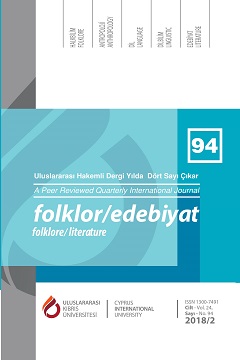Anadolu Türk Kültürünün Tasavvufu Açıklama İşlevi: Cabbar Kulu Kitabı Örneği
The Function of Explaining Sufism of Anatolian Turkish Culture: The Sample of Cabbar Kulu Book
Author(s): Cafer ÖzdemirSubject(s): Cultural history, Metaphysics, Epistemology, Islam studies, Philosophy of Religion, History of Religion
Published by: Uluslararası Kıbrıs Üniversitesi
Keywords: culture; function; Sufism; Alevi-Bektashi; Cabbar Kulu book;
Summary/Abstract: Alevi-Bektashi Culture, as a continuum of Turkish culture, emerged as a consequence of a new composition of Islamic beliefs in Anatolia with concrete and non-concrete elements brought from Middle Asia. It is clear that Turkish Sufi Notion which was transferred to Anatolia from Ahmet Yesevi has an important role in this composition. The Alevi-Bektashi community which has concerns for keeping religious and national elements vividly alive has played a crucial role in enabling Anatolian Turkish Culture to reach to the present day. In this study, the function of Anatolian Turkish cultures in the understanding of Sufi subjects in the book of Cabbar Kulu, a written work of Alevi-Bektashi literature in 18th century, was discussed. The richness of the socio-cultural life was addressed by presenting the functional aspects of culture in an integrated way and the concerns of Alawi-Bektashi community living in rural areas for transferring belief systems to individuals were emphasized. The study also emphasized this community’s use of literature as a tool to convey their belief systems to the future and in this way their anxieties about featuring didactic aspects of art. In addition to this, it was discussed with examples that which mystic elements were tried to be grasped with which cultural elements. Since the book of Cabbar Kulu is rich in terms of cultural material, cultural elements are mentioned in the study as titles. This book, in which there exist dialogues, questions and answers among Cabbar Kulu, being the main theme, Hz. Muhammad, Hz. Ali, Selman-i Fârisî, and Haci Bektas Veli, is a great literary work in terms of fictional aspect. The fact that the vast majority of the words mentioned in the work belong to the folk Turkish in an understandable way, and the preference of a style such as the style and the deep mysticism are explained in terms of cultural reasoning requires consideration of the function of the work. It is seen that the didactic aspects of the work and the teaching anxiety of the religious-sufi subjects have been attached importance. In this context, the book of Cabbar Auli exemplifies that cultural elements can be used in a different function. The book is a work that should be emphasized in terms of showing the interaction between religion and folk culture.
Journal: Folklor/Edebiyat
- Issue Year: 24/2018
- Issue No: 94
- Page Range: 55-72
- Page Count: 18
- Language: Turkish

